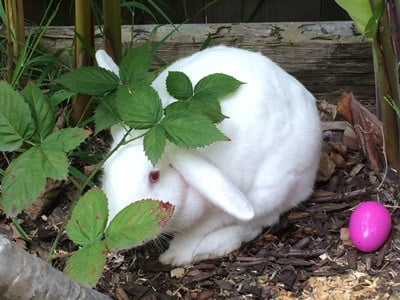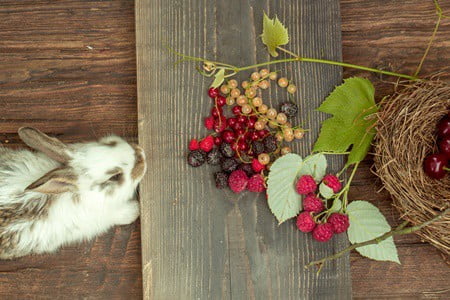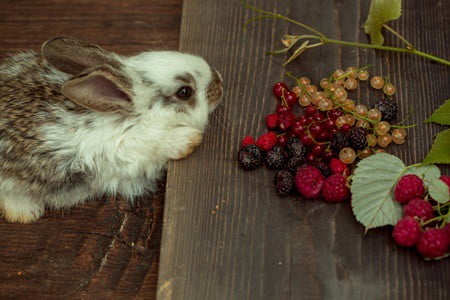Blueberries are among the most nutritious fruits in the world. These water-rich treats are packed with fiber, potassium, vitamin B6, folate, and an array of antioxidants. But, are blueberries healthy for rabbits?
Blueberries are safe for rabbits to eat. However, they’re high in fruit sugar (fructose), so they should only be offered as a treat. Too many blueberries can cause stomach issues, dental problems, and obesity.
In the wild, a rabbit’s diet rarely consists of fruit. So, limit your rabbit’s consumption to no more than 1-2 blueberries per week. Rabbits are grazing animals, so their diets should largely consist of hay and grass.
Are Blueberries Good for Rabbits?
Blueberries are OK for rabbits, as long as they’re given very occasionally.
Blueberries have a myriad of health benefits. They’re a richer source of fiber and water compared to many fruits.
Blueberries are lower in carbohydrates and sugars. Unfortunately, their fiber and sugar contents are sub-optimal for a rabbit’s diet.
What makes blueberries special is their antioxidant content. Blueberries are among the richest sources of anthocyanins and flavanols.
These may help lower blood sugar, improve blood flow, reduce the risk of cancer, heart disease, and diabetes.

Do Rabbits Like Blueberries?
Blueberries are high in fructose, so any rabbit is likely to love eating them. In the wild, rabbits are more likely to opt for the leaves and stems of a blueberry bush, instead of the fruit itself. However, it is common for domesticated rabbits to get spoiled for fruit.
As tempting as it can be to spoil your rabbit with delicious treats, you must prevent your rabbit from eating too much fruit. Overconsumption of fruit can easily lead to obesity and dental problems in rabbits.
At most, rabbits should be given only 1-2 tablespoons of fruit per day. It’s important to mix the fruit up so that your rabbit can benefit from a mix from antioxidants, vitamins, minerals, and fruit enzymes.
Health Benefits of Blueberries for Rabbits
Rabbits should be fed a high-fiber, low calorie, low sugar, and low-fat diet. They also need some plant-based protein for growth and development. Compared to other fruits (such as mango and grapes), blueberries are:
- Lower in calories
- Higher in protein
- Lower in sugar
- Higher in fiber
Although rabbits don’t need fruit on a regular basis, if you’re looking for a healthier treat for your pet’s diet, the blueberry is a good choice.
Blueberries are a rich source of the following:
- Water. 84% of each blueberry is made up of water. Water is imperative in a rabbit’s diet because it aids in hydration and proper bowel movements, while preventing dehydration and overheating.
- Vitamin A. This is required for healthy skin and vision. Your rabbit’s kidneys, lungs, and heart rely on this vitamin to function optimally.
- Vitamin K. Promotes healthy blood flow and lowers the risk of developing blood clots. Vitamin K ensures that minerals are carried effectively throughout the body. It may also benefit bone health.
- Folic acid. It improves the production of red blood cells, boosts immunity, and prevents anemia.
- Potassium and magnesium. These are healthy for your rabbit’s heart, helping it to sleep and aiding in muscle relaxation.
- Phosphorus. Works with calcium to keep bones and teeth healthy.
- Manganese. Required for normal protein, amino acid, lipid, and carbohydrate metabolism.
Blueberries are also packed with antioxidants, such as:
- Anthocyanins. Responsible for giving blueberries their color, anthocyanins help reduce a rabbit’s risk of heart-related disorders.
- Myricetin. A flavanol that may reduce the risk of cancer and diabetes.
- Quercetin. Another flavanol that lowers the risk of high blood pressure and heart disease.
Macronutrients
These are the types of nutrients that rabbits require in large quantities. They provide animals with a sustainable source of energy.
| Nutrients | Blueberries per 100g/raw | Mango per 100g/raw | Apple per 100g/raw | Grapes per 100g/raw |
|---|---|---|---|---|
| Calories | 57 | 72 | 52 | 69 |
| Water | 84% | 83% | 86% | 90% |
| Protein | 0.7g | 0.6g | 0.3g | 0.72g |
| Carbs | 14.5g | 15g | 13.8g | 18.1g |
| Sugar | 10g | 15g | 10.4g | 15.48g |
| Fiber | 2.4g | 1.5g | 2.4g | 0.9g |
| Fat | 0.3g | 0.2g | 0.2g | 0.16g |
Vitamins
These molecules are needed in small quantities to enable a rabbit to perform essential bodily processes.
| Vitamins in Blueberries | Amount Per 100 g |
|---|---|
| Vitamin A | 79.9IU |
| Vitamin C | 14.4mg |
| Vitamin E | 0.8mg |
| Vitamin K | 28.6mg |
| Thiamin | 0.1mg |
| Riboflavin | 0.1mg |
| Niacin | 0.6mg |
| Vitamin B6 | 0.1mg |
| Folate | 8.9mcg |
| Pantothenic Acid | 0.2mg |
| Choline | 8.9mg |
| Betaine | 0.3mg |
Minerals
These are naturally-occurring substances that enable a rabbit’s body to grow and remain healthy. They are needed in small quantities.
| Minerals in Blueberries | Amount Per 100 g |
|---|---|
| Calcium | 8.9mg |
| Iron | 0.4mg |
| Magnesium | 8.9mg |
| Phosphorous | 17.8mg |
| Potassium | 114mg |
| Zinc | 0.2mg |
| Copper | 0.1mg |
| Manganese | 0.5mg |
| Selenium | 0.1mcg |
How Many Blueberries Can Rabbits Safely Eat?
Blueberries are classified as treats. You should offer no more than 1-2 blueberries to your rabbit each week.
In the wild, rabbits rarely have access to any fruit, let alone blueberries. Their diets predominantly consist of grass, hay, leaves, and stems.
Even with wild berries, rabbits are mostly seen chewing on the leaves and stems of the bushes, not the berries.
However, rabbits love the taste of blueberries. So why shouldn’t they have more of this irresistible treat?
High in Sugar
Blueberries are a rich source of fruit sugar. Sugar, in excess, can cause major digestive issues in rabbits. Overindulging in fruits can cause a rabbit to experience uncomfortable bloating and tummy pain.
In severer cases, your rabbit may even suffer from digestive issues, such as loose stools or diarrhea and GI stasis.
If this is your rabbit’s first time eating blueberries, introduce the fruit slowly. Offer one blueberry and monitor your rabbit’s digestion for the next 12 to 24 hours.
Your rabbit’s behavior and droppings will indicate whether they’re healthy or are suffering from a digestive problem.
Low in Fiber
80 to 90% of a rabbit’s diet should be made up of hay and grass because they’re rich sources of fiber, while being low in sugar and calories.
Rabbits heavily rely on fiber for their nutrition. Lagomorphs have highly specialized digestive tracts that can digest fiber and retrieve important vitamins and minerals from them.
Unfortunately, blueberries have a very low fiber content. Too much low-fiber, high-sugar foods is a surefire way of causing obesity in rabbits.
Therefore, even though a blueberry or two will make a delicious treat for a rabbit, it’s less likely to offer any major health benefits if given in excess.
Overfeeding Blueberries to Rabbits
If you’ve been giving too many blueberries and other fruit treats to your rabbit, it’s time to bring its diet back to a normal healthy one.
Wild rabbits enjoy eating blueberry plants. You can curb your rabbit’s blueberry addiction by substituting them for blueberry stalks and leaves.
If you don’t have access to blueberry stalks and leaves, try the leaves of raspberry, blackberry, or strawberry plants. Carrot tops are another excellent choice, and they’re widely available in grocery stores.
Continue offering a healthy dosage of 1-2 berries a week, supplemented with healthy leafy greens.
Can Rabbits Eat Blueberries with Skin?
Removing the skin of blueberries isn’t only a laborious process, it’s also completely unnecessary, even while feeding rabbits.
Blueberry skin is healthy for rabbits. In fact, most of the fiber and antioxidants in blueberries are in their skin.
Anthocyanins, an important antioxidant in blueberries, seem to be concentrated in the skin as well. This proves that the outer layer of the berry is the healthiest part for your rabbit to eat.

Can Rabbits Eat Blueberries with Seeds?
Blueberry seeds are so tiny that they will not cause any damage. Chances are your rabbit will pass the seed out with its poop and not feel a thing.
If it does make you feel better, you can cut a blueberry open, remove the seeds from the blueberry and feed the pulp and peel only.
Alternatively, you can give your rabbit 1-2 blueberries with the seeds and watch your pet closely for any signs of gastric distress.
Keep in mind that the seeds from most other fruits should be removed, due to the harmful chemicals they contain and the risk of choking. But when it comes to blueberries, seeds are almost always safe.
Can Rabbits Eat Blueberry Leaves and Stems?
Rabbits love nibbling at blueberry plants. In fact, blueberry bushes are among the most preferred plants by rabbits.
According to the University of Minnesota, rabbits really enjoy chewing on the stems of blueberry bushes in the winter.
The Cornel University of Agriculture and Life Sciences also mentions that wildlife feeding by rabbits causes physical damage to blueberries.
Blueberries are a healthy and safe fruit to feed rabbits. Just remember not to give your rabbit more than 1-2 per week. Giving your rabbit too many blueberries can cause obesity and digestive problems.

